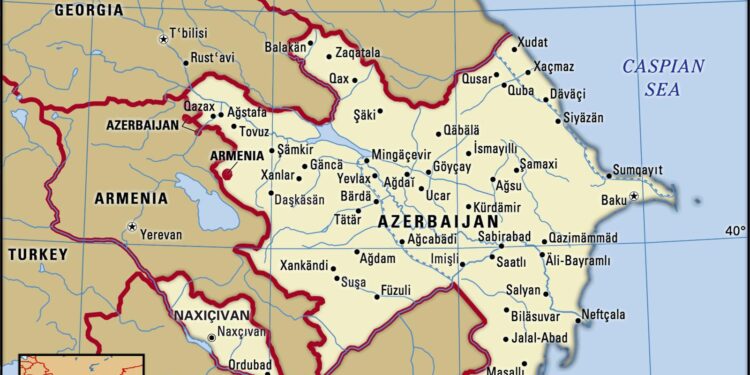Western governments and commentators have increasingly rallied behind Azerbaijan in its escalating conflict with Russia, often portraying Baku as the underdog deserving of unequivocal support. However, a closer examination reveals that many Western responses lack nuance, overlooking the complex geopolitical realities and longstanding regional tensions at play. This article explores why rushing to Azerbaijan’s defense against Russia may be a misguided strategy, urging policymakers to adopt a more measured and informed approach to a volatile situation that demands careful diplomacy over hasty alliances.
Western Missteps in Aligning with Azerbaijan Against Russia
The Western response to the Azerbaijan-Russia dynamics exhibits a striking miscalculation, rooted in an oversimplified narrative of support and opposition. By rushing to defend Azerbaijan unconditionally, policymakers risk escalating regional tensions without a coherent strategy to balance geopolitical interests. This approach not only neglects the complex historical ties between Azerbaijan and Russia but also discounts the delicate ethnic and political fabric of the South Caucasus. Ignoring these factors may inadvertently empower hardline factions and undermine efforts for a sustainable peace framework.
Furthermore, the Western alliance with Azerbaijan tends to overlook several critical considerations:
- Energy geopolitics: Azerbaijan’s role as a key hydrocarbon supplier is deeply intertwined with broader Eurasian energy markets, which involve Russia and its strategic partners.
- Regional security balance: Elevating Azerbaijan without engaging Russia risks alienating Moscow at a time when cooperative diplomacy is crucial.
- Long-term stability: The focus on immediate tactical gains distracts from the necessity of addressing frozen conflicts and humanitarian issues that plague the region.
| Aspect | Western Approach | Potential Risks |
|---|---|---|
| Diplomatic Engagement | Firm support for Azerbaijan | Marginalizing Russia, increasing tensions |
| Energy Policy | Encouraging diversification | Ignoring interdependence with Russian markets |
| Conflict Resolution | Backing military strength | Undermining peaceful negotiations |
Geopolitical Risks and the Escalation of Regional Conflicts
Western policymakers’ uncalculated support for Azerbaijan risks igniting a powder keg in the South Caucasus, where longstanding regional dynamics defy simple narratives. Russia’s strategic interests in this corridor are significant, and Moscow’s response to perceived encroachments will likely be swift and severe. Instead of acting as a neutral mediator, Western nations appear to be entangling themselves in a conflict laden with historical grievances, ethnic complexities, and geo-economic stakes, thus escalating tensions rather than facilitating dialogue.
- Energy corridors: Azerbaijan’s pipelines offer crucial routes bypassing Russia, challenging Moscow’s dominance over Eurasian energy flows.
- Military posturing: Heightened arms transfers risk transforming localized skirmishes into wider confrontations.
- Proxy implications: External backings risk dragging neighboring states into a broader conflict web.
Here’s a simplified breakdown of the key factors intensifying regional instability:
| Factor | Impact | Stakeholders |
|---|---|---|
| Geopolitical Rivalry | Undermines regional balance | Russia, West, Azerbaijan, Armenia |
| Ethnic Tensions | Fuel for recurring clashes | Local populations, Militias |
| Energy Security | Motivates international interest | Energy exporters, transit countries |
Amid these complexities, a cautious strategy emphasizing diplomacy over knee-jerk alignments is crucial. Otherwise, the fallout may reverberate far beyond Azerbaijan’s borders.
Strategic Recommendations for a Balanced Western Approach
In navigating the complex geopolitics of the Caucasus region, Western policymakers must exercise measured prudence rather than impulsive allegiance. The temptation to cast Azerbaijan as a frontline ally against Russian interests overlooks the broader strategic implications for regional stability. Instead of reflexively supporting one side, Western actors should prioritize diplomatic engagement that encourages dialogue and conflict de-escalation. Key approaches include:
- Promoting multilateral peace talks facilitated by neutral international bodies
- Enhancing transparent communication channels among involved parties
- Supporting humanitarian initiatives to alleviate civilian suffering
- Encouraging economic cooperation projects that provide mutual benefits
Furthermore, a pragmatic strategy demands a realistic assessment of Russia’s historical influence and military presence in the region. Rather than provoking direct confrontation, Western actors should adopt a calibrated posture, balancing pressure with incentives for conflict resolution. This balanced approach can prevent unnecessary escalation and foster a durable peace dynamic that serves both regional interests and international stability. The table below illustrates a comparative analysis of various strategic options and their potential outcomes:
| Strategy | Potential Benefits | Possible Risks |
|---|---|---|
| Unconditional Military Support to Azerbaijan | Immediate tactical advantage; strengthened alliance | Escalated conflict; alienation of Russia; regional instability |
| Facilitated Multilateral Diplomacy | Conflict de-escalation; sustainable peace prospects | Slow progress; requires sustained commitment |
| Economic and Humanitarian Initiatives | Improved relations; reduced civilian suffering | Indirect impact on conflict; potential misuse of aid |
| Strategic Neutrality | Preserves Western influence; avoids direct conflict | Perceived passivity; risk of diminished leverage |
In Summary
In a complex geopolitical landscape, the rush by some Western actors to unequivocally side with Azerbaijan against Russia risks oversimplifying a multifaceted conflict and undermining long-term regional stability. As Responsible Statecraft underscores, measured diplomacy and a nuanced understanding of historical and strategic realities remain essential. Moving forward, policymakers must resist the impulse for hasty alignments and instead prioritize careful analysis that acknowledges the broader consequences for peace and security in the South Caucasus.
















